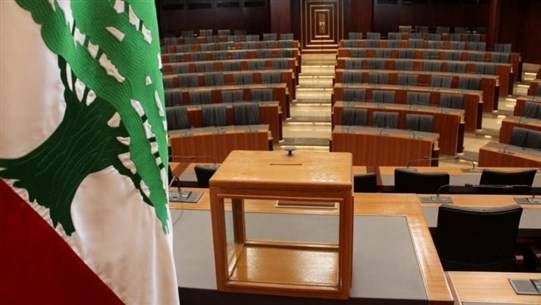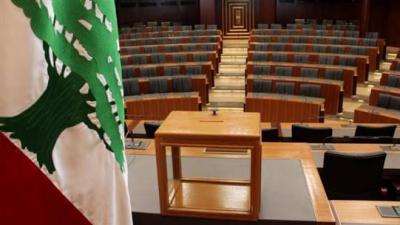The last five sessions of the parliament to elect a president of the republic, as well as the upcoming sixth session next Thursday, cement a state of stagnation and suggest that the electoral process may drag on for a long time, possibly for months. The supporters of white ballots remain steadfast, and the opposing team, which supports the nomination of MP Michel Moawad or votes for various names unrelated to the situation at hand, also remains unyielding. The fluctuation of numbers does not signify a win or loss but rather serves as a pulse check. The ongoing entertainment is justified not only by the manipulation of numbers but also by excessive interpretations and misinformed assumptions that suggest the secret behind the presidential election is now exposed and that approaching an election session is imminent. For the third consecutive time, this charade is being resumed, reminiscent of the wasted time following the years 2007 and 2014, as we await the serious date for electing a president. This was always spoken of by the late Jean Obeid when he distinguished between the time of nominations and the time of presidencies, and the circumstances surrounding nominations versus those surrounding voting. Therefore, the call by the parliament to successive sessions determined by its president Nabih Berri as one of his constitutionally delegated powers is necessary, yet it currently has no relation to the entertainment with numbers.
Breaking the current electoral impasse requires dismantling this closed loop reminiscent of the 2014 - 2016 deadline. Back then, the elections were paralyzed for 45 sessions due to the sole presence of one serious candidate, President Michel Aoun, amidst those who wanted him and those who did not, along with others who did not know whom they wanted. Today’s replay resembles the past but is simultaneously contradictory: One faction has a candidate and continues to declare that there is no other candidate apart from him, as the numbers of votes supporting Moawad improve session after session, while the other faction still holds on to white ballots as its immediate candidate, although Hezbollah's Secretary-General Hassan Nasrallah recently (on November 11) specified criteria for only two candidates he trusts, with the first candidate outweighing the second for several valid reasons. These are Suleiman Frangieh, the head of the Marada Movement, and Jebran Bassil, the head of the Free Patriotic Movement. It is clear from Nasrallah's stance, as highlighted by the specifications he provided aimed at reassuring the resistance—his key convincing element—that his undisclosed candidate is not intended to be a practice for parliamentary voting sessions but rather to be taken directly to the election session. While not officially stated, it is widely known.
The common denominator between the two factions, the one supporting Moawad and the one voting with white ballots, is that both possess the ability to obstruct the quorum necessary for the assembly of parliament but lack the means to enforce the election of the candidate. This ongoing balance has persisted since the election of President Michel Sleiman in 2008, stemming from the escalation of Sunni-Shiite disputes, the last of which manifested in the events of May 7. Following this was the vacancy from 2014 to 2016, until Prime Minister Saad Hariri joined Hezbollah's choice of Aoun, resulting in a voting agreement that also stemmed from a Shiite-Sunni consensus bolstered by a wide Christian accord, prepared under the Ma’arab agreement. In the current electoral process, the Sunni voter has lost both their assisting and obstructive roles as seen in 2007 and 2014, while the Shiite voter remains at the peak of their power and perhaps even more so.
Thus, the ongoing confrontation surrounding the presidential election is viewed, in its narrow local dimension, as being between one faction with considerable strength and another that is excessively fragmented. The real balance dilemma arising between them impedes the election of a president from either side and is at odds with controlling internal balances, treating them as final bases for predictions and calculations. Among these factors are:
1. The constitutional constraint mandated by Article 49, both in text and in custom, that parliament cannot convene to elect a president unless a two-thirds majority is present in all voting rounds. Thus, each of the divergent parties, the Shiite duo and their allies, as well as the other faction (Walid Jumblatt, the opposition, and the reformists), holds the obstructive third to convene the council without being able to provide the two-thirds necessary for election at any time. This is the context currently valid in light of everyone’s certainty that it is not yet time for a serious election. What is also confirmed is that the election mechanism as per Article 49 has become a reality; there will be no president outside its conditions.
2. "The enmity of the craft," as described by Suleiman Frangieh, under the burden of competition within each alliance and coalition. The primary foes in this craft are the Maronites, as they are most concerned with the presidential election: the disputes among their parties and movements, and their power struggles and monopolizations, whether between the factions of March 8, such as the Marada and the Free Patriotic Movement, or between historical enemies like the Free Patriotic Movement, the Lebanese Forces, the Marada, and the Kataeb Party. This same enmity has erupted between the reformists and independents, who find it challenging to agree on a candidate representing the intersection of their diverging views and options.
3. It is perhaps paradoxical that Walid Jumblatt does not independently favor a presidential candidate this time without being certain of winning. His candidate is merely one means of recalibrating balances and facilitating concessions. For reasons he knows best, he now prefers to watch the elections from the sidelines, while consistently supporting Moawad. Both factions cling to him, those with him and those waiting for him afterward, without him being firmly committed to either. He has become a necessity for both. Who still remembers that he nominated the Maronite Antoine Ashkar, a member of his party, on the eve of President Amin Gemayel’s term ending in 1988 and nominated Jean Obeid during the subsequent electoral processes, and then he nominated a member of his parliamentary bloc, Henry Helou, for the 2014 elections? Before him, his late father, Kamal Jumblatt, nominated Jamil Lahoud for the 1970 elections, who received 5 votes, and prior to that in the 1964 election, he nominated Abdul Aziz Shihab to succeed President Fouad Shihab when he was a member of his parliamentary bloc at that time.




